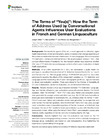The Terms of “You(s)”: How the Term of Address Used by Conversational Agents Influences User Evaluations in French and German Linguaculture
dc.contributor.author
Ollier, Joseph
dc.contributor.author
Nißen, Marcia Katharina
dc.contributor.author
von Wangenheim, Florian
dc.date.accessioned
2022-01-13T09:05:03Z
dc.date.available
2022-01-13T09:05:03Z
dc.date.issued
2022-01-05
dc.identifier.issn
2296-2565
dc.identifier.other
10.3389/fpubh.2021.691595
en_US
dc.identifier.uri
http://hdl.handle.net/20.500.11850/525167
dc.identifier.doi
10.3929/ethz-b-000519997
dc.description.abstract
Background: Conversational agents (CAs) are a novel approach to delivering digital health interventions. In human interactions, terms of address often change depending on the context or relationship between interlocutors. In many languages, this encompasses T/V distinction—formal and informal forms of the second-person pronoun “You”—that conveys different levels of familiarity. Yet, few research articles have examined whether CAs' use of T/V distinction across language contexts affects users' evaluations of digital health applications.
Methods: In an online experiment (N = 284), we manipulated a public health CA prototype to use either informal or formal T/V distinction forms in French (“tu” vs. “vous”) and German (“du” vs. “Sie”) language settings. A MANCOVA and post-hoc tests were performed to examine the effects of the independent variables (i.e., T/V distinction and Language) and the moderating role of users' demographic profile (i.e., Age and Gender) on eleven user evaluation variables. These were related to four themes: (i) Sociability, (ii) CA-User Collaboration, (iii) Service Evaluation, and (iv) Behavioral Intentions.
Results: Results showed a four-way interaction between T/V Distinction, Language, Age, and Gender, influencing user evaluations across all outcome themes. For French speakers, when the informal “T form” (“Tu”) was used, higher user evaluation scores were generated for younger women and older men (e.g., the CA felt more humanlike or individuals were more likely to recommend the CA), whereas when the formal “V form” (“Vous”) was used, higher user evaluation scores were generated for younger men and older women. For German speakers, when the informal T form (“Du”) was used, younger users' evaluations were comparable regardless of Gender, however, as individuals' Age increased, the use of “Du” resulted in lower user evaluation scores, with this effect more pronounced in men. When using the formal V form (“Sie”), user evaluation scores were relatively stable, regardless of Gender, and only increasing slightly with Age.
Conclusions: Results highlight how user CA evaluations vary based on the T/V distinction used and language setting, however, that even within a culturally homogenous language group, evaluations vary based on user demographics, thus highlighting the importance of personalizing CA language.
en_US
dc.format
application/pdf
en_US
dc.language.iso
en
en_US
dc.publisher
Frontiers Media
en_US
dc.rights.uri
http://creativecommons.org/licenses/by/4.0/
dc.subject
Conversational Agents
en_US
dc.subject
Chatbots
en_US
dc.subject
Term of Address
en_US
dc.subject
T/V Distinction
en_US
dc.subject
Linguaculture
en_US
dc.subject
Digital Health
en_US
dc.title
The Terms of “You(s)”: How the Term of Address Used by Conversational Agents Influences User Evaluations in French and German Linguaculture
en_US
dc.type
Journal Article
dc.rights.license
Creative Commons Attribution 4.0 International
ethz.journal.title
Frontiers in Public Health
ethz.journal.volume
9
en_US
ethz.journal.abbreviated
Front. Public Health
ethz.pages.start
691595
en_US
ethz.size
19 p.
en_US
ethz.version.deposit
publishedVersion
en_US
ethz.code.ddc
DDC - DDC::6 - Technology, medicine and applied sciences::600 - Technology (applied sciences)
en_US
ethz.code.ddc
DDC - DDC::6 - Technology, medicine and applied sciences::650 - Management & auxiliary services
en_US
ethz.code.ddc
DDC - DDC::6 - Technology, medicine and applied sciences::610 - Medical sciences, medicine
en_US
ethz.code.ddc
DDC - DDC::4 - Language::400 - Language, linguistics
en_US
ethz.code.ddc
DDC - DDC::4 - Language::430 - Germanic
en_US
ethz.code.ddc
DDC - DDC::4 - Language::440 - Romance languages French
en_US
ethz.identifier.wos
ethz.identifier.scopus
ethz.publication.place
Lausanne
en_US
ethz.publication.status
published
en_US
ethz.leitzahl
ETH Zürich::00002 - ETH Zürich::00012 - Lehre und Forschung::00007 - Departemente::02120 - Dep. Management, Technologie und Ökon. / Dep. of Management, Technology, and Ec.::03995 - von Wangenheim, Florian / von Wangenheim, Florian
en_US
ethz.leitzahl.certified
ETH Zürich::00002 - ETH Zürich::00012 - Lehre und Forschung::00007 - Departemente::02120 - Dep. Management, Technologie und Ökon. / Dep. of Management, Technology, and Ec.::03995 - von Wangenheim, Florian / von Wangenheim, Florian
en_US
ethz.relation.isCitedBy
10.3929/ethz-b-000613743
ethz.date.deposited
2021-12-10T12:03:07Z
ethz.source
FORM
ethz.eth
yes
en_US
ethz.availability
Open access
en_US
ethz.rosetta.installDate
2022-01-13T09:05:15Z
ethz.rosetta.lastUpdated
2024-02-02T15:54:42Z
ethz.rosetta.versionExported
true
dc.identifier.olduri
http://hdl.handle.net/20.500.11850/524709
dc.identifier.olduri
http://hdl.handle.net/20.500.11850/519997
ethz.COinS
ctx_ver=Z39.88-2004&rft_val_fmt=info:ofi/fmt:kev:mtx:journal&rft.atitle=The%20Terms%20of%20%E2%80%9CYou(s)%E2%80%9D:%20How%20the%20Term%20of%20Address%20Used%20by%20Conversational%20Agents%20Influences%20User%20Evaluations%20in%20French%20an&rft.jtitle=Frontiers%20in%20Public%20Health&rft.date=2022-01-05&rft.volume=9&rft.spage=691595&rft.issn=2296-2565&rft.au=Ollier,%20Joseph&Ni%C3%9Fen,%20Marcia%20Katharina&von%20Wangenheim,%20Florian&rft.genre=article&rft_id=info:doi/10.3389/fpubh.2021.691595&
Files in this item
Publication type
-
Journal Article [128713]

